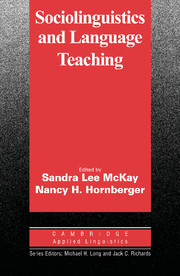Part I - LANGUAGE AND SOCIETY
Published online by Cambridge University Press: 22 July 2009
Summary
The chapters in this part explore how the larger social and political context can affect social attitudes toward particular languages and language varieties, as well as individual motivation to learn a language. This part also examines the manner in which the social and political context influences language use on a macrolevel as, for example, in the designation of an official language or a bilingual's choice of language. Taken together, all the chapters in Part I employ a macrolevel social and linguistic analysis as they describe such concepts as linguistic standards, diglossia, language transfer, and corpus and status planning. We begin with a focus on language attitudes, since it is here that the social and individual factors of language use dramatically affect one another.
In the first chapter, “Language Attitudes, Motivation, and Standards,” Mary McGroarty examines how social factors influence an individual's attitude and motivation toward learning a language and how social attitudes create and legitimize language standards. In this chapter, McGroarty provides a definition of attitudes and motivation and surveys early research of these constructs. She then discusses current theoretical approaches to studying language attitudes and motivation, emphasizing the research done in school settings and on teacher, student, and parent attitudes. Next, McGroarty discusses how language attitudes influence the creation of norms and standards as well as the formation of language policies.
- Type
- Chapter
- Information
- Sociolinguistics and Language Teaching , pp. 1 - 2Publisher: Cambridge University PressPrint publication year: 1995

